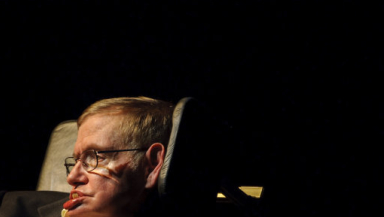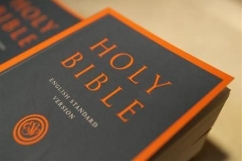
"Show me the evidence." Last week we looked at why this apparently reasonable request is difficult to answer because of pride ("I am capable of judging the evidence") and prejudice ("there can be no evidence"). You can read the original article here.
The reaction was interesting, not least when it came to the question "What evidence for God would you accept?" Not one person who tweeted/blogged/e-mailed was able to say what evidence for God they would accept. It appears that people can accept plenty evidence against God, but there is nothing that they would accept as evidence for God, because such evidence can, and always will be, explained away.
Why is this? Perhaps the main cause is the perceived opposition between faith and science, expressed in the simplistic formula, "You have faith, I have science." The belief that science and faith are opposed is one of those atheist myths that have grown so strong in popular culture that it is has become a major hindrance to sharing the gospel. Let me tell you a story.
A long time ago (about 20 years) in a land far away (Scotland) a nervous young minister (yours truly) knocked on a door that was answered by a rather rotund, middle-aged man.
"I'm from the local church", said the minister.
"Hang on, I'll get the wife," came the response (because after all, in the world of the macho male only women and children are weak enough to need religion).
"No," said the young minister,"you beard, me beard, we both man (this in a vain attempt to have an incarnational ministry).
"I don't believe in God, I believe in science," he countered.
"Oh – you a scientist?" "Nah."
"You studied science?" "Nah."
"You read science?" "Nah."
"You know anything about science?" "Nah – I just believe in it."
That may be a somewhat simplistic version, but it is a common belief among many. It is something that through media, popular culture and dumbed-down education, is now an accepted part of the zeitgeist.
And it's completely wrong. It relies on a misunderstanding of both faith and science. First, faith is not blind belief. Christians are not 'people of faith'. We are people who have faith in Christ. And that faith is trust/belief based upon evidence – not despite or contrary to the evidence. In other words, Christianity is not something based upon blind faith that is in opposition to science. Instead it is something that is based upon evidence, including the evidence of science.
There is also a misunderstanding about what science is. Science is a method, not a person or philosophy. "Science is the concerted human effort to understand, or to understand better, the history of the natural world and how the natural world works, with observable physical evidence as the basis of that understanding," as one definition has it. But it is a limited method. It is carried out by limited human beings and it is only concerned with the observable physical world. It cannot by definition tell us about the unobservable non-physical world. Therefore to use naturalistic science to attempt to prove of disprove a supernatural God is illogical.
Science is also morally neutral. It can tell us how to split the atom, but it cannot tell us whether it is better to build a bomb or a nuclear power station with that knowledge.
Despite this some atheists try to argue that science does or can explain everything. An example is the Oxford chemistry professor Peter Atkins who claimed that "science is omnipotent" and that science can account for everything. There is a wonderful answer to this from William Lane Craig in a debate he had with Atkins.
Craig points out that science cannot account for logical and mathematical truths, metaphysical truths (such as "there are other minds than my own"), ethical beliefs, aesthetic judgements ("the beautiful, like the good cannot be scientifically proven") and that science itself cannot be justified entirely by the scientific method.
The trouble with Atkins position is that he just has a blind faith that one day science will be able to tell us everything. Instead of the 'God of the gaps' (where God is only used as an explanation for what we do not know, rather than the reason for what we do), Atkins has a 'science of the gaps'. We don't know but 'science' does. This is a common myth that we need to debunk.
The problem here is not with science as a method of discovering knowledge about the natural world, but with the philosophy of scientism (naturalism) that says that the natural world is the only world that can exist. Here we have to do a wee bit of philosophy – despite the fact that atheistic apologists like Dawkins and Hawking want us to avoid all philosophy.

AJ Ayer in the 1920's wrote a book called Language, Truth and Logic which espoused a philosophy called Logical Positivism. What does that have to do with the man on the street today? Because, despite being debunked by most serious philosophers it is now the default philosophy of the common man. Logical positivism states that something can only be real or true if it can be empirically demonstrated to be true. So the ordinary Westerner will insist: "I would believe in God if I could see, touch, hear him."
Note how we are back here to the demand for evidence – and of a particular type of evidence, that can be judged by our senses. The trouble is, as Ayer himself admitted in a BBC interview towards the end of his life, that logical positivism is nonsense because it is self-refuting. The statement that the only things that are true are those things that can be empirically demonstrated to be true, is itself unprovable, so by its own logic it cannot be true! The "man on the street" has locked himself into a worldview and a philosophy that is false and yet on the basis of that false way of thinking, rejects any evidence for God.
Enough of the heavy philosophy – important though it is. Given that science cannot explain everything and that naturalism is as much a 'faith' position as any other philosophy or religious system of thought, what can science tell us, and about what? For example, what about evolution? Richard Dawkins's whole position can be boiled down to two main points. 1) Evolution is true and 2) because evolution is true there is no God.
It's a position that seems to be widely accepted in popular culture. I was in a school yesterday where some of the pupils told me they did not believe in God, they believed in evolution – as though evolution were an alternative faith (which for some people it seems to be). And yet premise 2) does not automatically follow from premise 1). It is quite logical to believe that God used evolution to create. There are Christians who are young earth creationists, there are others who are old earth creationists, there are those who are theistic evolutionists, and there are some of us who just don't know. Even if we grant that macroevolution is demonstrated beyond any doubt, that does not mean that there is no God.
But what about the evidence of science? Is it completely neutral? No. While a supernatural being cannot be absolutely proven by naturalistic methods alone, it is still the case that science points to, rather than away from, God. Yes, there are many scientists who are atheists, but that is as much because of their culture and background as it is because of their science.
There are also many Christians who are scientists. The observation of the natural is a pointer towards God. The heavens declare the glory of God (Psalm 19); there is no land where their speech is not heard. The Bible tells us that "what may be known about God is plain to them, because God has made it plain to them. For since the creation of the world God's invisible qualities – his eternal power and divine nature – have been clearly seen, being understood from what has been made, so that men are without excuse" (Romans 1:18-20). The fine-tuning of the universe, the marvels of DNA, the consciousness of humanity are all pointers towards the God who made it all, along with many other 'wonders' of the natural world.
There are those of course who just simply deny that. Their faith (that there can be nothing beyond the 'natural') is so deeply ingrained that they are prepared to believe that it all came from nothing, by nothing and for nothing. This weeks recommended book is John Lennox's God's Undertaker – Has Science Buried God? In it Lennox concludes by asking: "Inevitably, of course, not only those of us who do science, but all of us, have to choose the presupposition with which we start. There are not many options – essentially just two. Either human intelligence ultimately owes its origin to mindless matter; or there is a Creator. It is strange that some people claim that it is their intelligence that leads them to prefer the first to the second."
But what about Christian opposition to science? Do not all religious people oppose science? Are they not in competition as alternative explanations? Again this is so much part of the common mythology that the only way to deal with it is patiently, historically and factually. This week I was speaking at a University event and I was told that Christians had opposed every scientific advance. When asked to give an example the speaker said "the printing press"! I assume he had not heard of the first printing press, the Gutenberg press, used to print the Gutenberg Bible.
Christians welcome science because in the words of the greatest scientist, the Puritan Isaac Newton, God has two books, the book of general revelation, nature, and the book of special revelation, the Bible. They are complementary to one another, not opposed. In fact a case can be made that without a theistic understanding of the universe, science itself would have no reasonable foundation. Ultimately only those who believe in an ordered (created?) universe with scientific laws, can do science without compartmentalising.
So how can Christians deal with this deeply ingrained 'defeater belief'?
We should think about and discuss these things. A superb resource for doing so is the wonderfully produced God Question series which is a balanced look at the whole subject from a wide variety of people (including prominent atheists) and gives a great opportunity for us to show that we are not scientific ignoramuses.

And we should encourage people to realise that science and faith in Christ are not opposed. Indeed the science onlyposition is one that is profoundly dark and depressing. Last week Stephen Hawking, a born and bred atheist, warned us that science will wipe out the planet. We have a far greater hope. We have a far greater and clearer vision. We see the sun with the eyes in our head, we see the Son through the eyes of our heart.
In the latest edition of The Dawkins Letters we included the testimony of Richard Morgan, who was an atheist participant in the Dawkins website, until he became enlightened. In reflecting upon this whole question of evidence, science and faith he observed: "I have my five senses and a brain that works in a particular way to process what my five senses pick up. But that doesn't prove that anything that can't be captured by my five senses doesn't exist. If ever, in a science fiction journey, I came across a universe where living beings had 10 senses, well, I could only have half as much fun as they did."
Richard then goes on to describe his conversion as he reflected on the words: "We can love Him, because He loved us first," by giving the best description I have ever heard of the change becoming a Christian makes: " As I considered my perception of life, the universe and everything, it was literally as if I had been looking at a two dimensional image in black and white, and in an instant everything became three dimensional and Technicolor!"
I will leave the final word with Richard: "It is so good to be loved, without having done anything to deserve it. It is so good to raise my eyes from the science laboratories and the books of philosophy and start to behold the glory of God. Science and philosophy are wonderful manifestations of the enormous capacities of the human mind. But the Word of God is Truth, and truth is what it took to set me free. My journey in faith begins". What about yours?


















